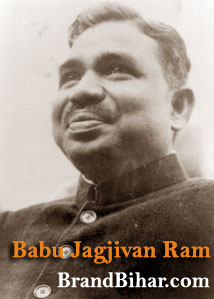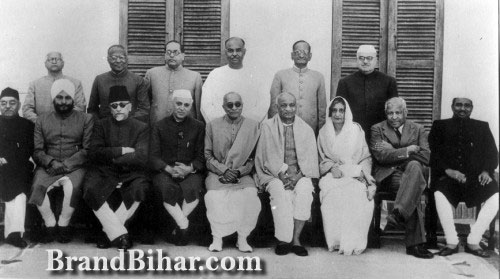Babu Jagjivan Ram (1908 - 1986)
Parliamentary career of Babu Jagjivan Ram In 1946 he became the youngest minister in Jawaharlal Nehru's provisional government and also the subsequent First Indian Cabinet, as a Labour Minister, where he is credited for laying the foundation for several labour welfare policies in India. He was a part of the prestigious high profile Indian delegation that attended to attend the International Labour Organization (ILO)'s International Labour Conference on 16 August 1947 in Geneva along with the great Gandhian Bihar Bibhuti Dr. Anugrah Narayan Sinha his chief political mentor and also the then head of the delegation, and few days later he was elected President of the ILO. He served as Labour minister until 1952, later he several Ministerial posts in Nehru's Cabinet,Communications (1952–56), for Transport and railways (1956–62), and for Transport and communications (1962–63).
In Indira Gandhi's government he worked as minister for Labour, employment, and rehabilitation (1966–67), and Union minister for Food and agriculture (1967–70), where he is best remembered for having successfully led the Green Revolution during his tenure. When the Congress Party split in 1969, Jagjivan Ram joined the camp led by Indira Gandhi, and became the president of that faction of Congress. He worked as the Minister of Defence (1970-74) making him the virtual No. 2 in the cabinet, minister for Agriculture and irrigation (1974-77). It was during his tenure as the minister of Defence that the Indo-Pakistani War of 1971 was fought, and Bangladesh achieved independence. While loyal to Prime Minister Indira Gandhi for most of the Indian Emergency, in 1977 he along with five other politicians resigned from the Cabinet and formed the Congress for Democracy party, within the Janata coalition. A few days before the elections, on a Sunday, Jagjivan Ram addressed an Opposition rally at the famous Ram Lila Grounds in Delhi. The national broadcaster Doordarshan allegedly attempted to stop crowds from participating in the demonstration by telecasting the blockbuster movie Bobby. The rally still drew large crowds, and a newspaper headline the next day ran "Babu beats Bobby". He was the Deputy Prime Minister of India when Morarji Desai was the Prime Minister, from 1977 to 1979, though initially reluctant to join the cabinet, and was not present at the oath-taking ceremony on 27 March 1977; he eventually did so at the behest of Jai Prakash Narayan, who insisted that his presence for necessary, "not just as an individual but as a political and social force" and took oath later on [19]. However, he was once again given the defence portfolio. Disillusioned with the Janata party he formed his own party, the Congress (J). He remained a member of Parliament till his death in 1986, after over forty years as a parliamentarian. He was elected from Sasaram parliament constituency in Bihar. His uninterrupted representation in the Parliament from 1936 to 1986 was a world record, until Tony Benn overtook him by serving 51 years (1950-2001) in the British parliament. Positions held by Babu Jagjivan Ram Union Minister of Labour, 1946-1952. Union Minister for Communications, 1952-1956. Union Minister for Transport and Railways, 1956-1962. Union Minister for Transport and Communications, 1962-1963. Union Minister for Labour, Employment and Rehabilitation, 1966-1967. Union Minister for Food and Agriculture, 1967-1970. Union Minister of Defence, 1970-1974, 1977-1979. Union Minister of Agriculture and Irrigation, 1974-1977. Founding Member, Congress for Democracy party (aligned with Janata Party), 1977. Deputy Prime Minister of India, March 23, 1977-August 22, 1979. Founder, Congress (J). He served as President of the Bharat Scouts and Guides from September 1976 to April 1983. |


